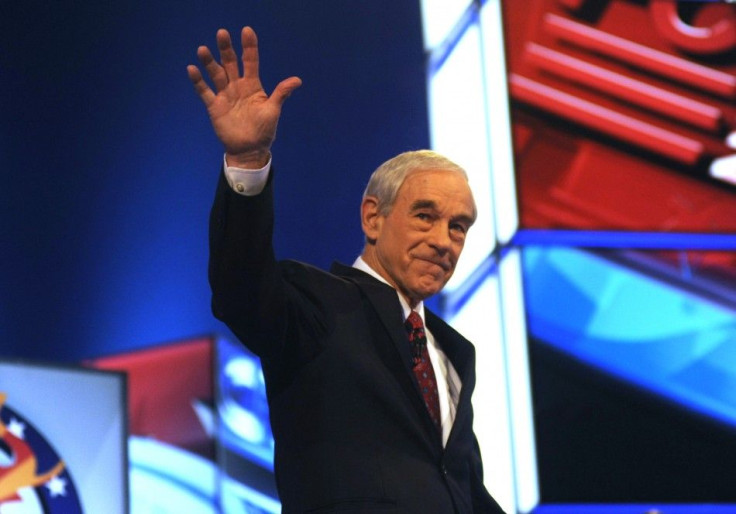Why Ron Paul Spends More Per Vote Than Any Other Republican Primary Candidate

Ron Paul has the fewest votes of any Republican presidential candidate this year, but his campaign spending would seem to tell a different story.
The reason? Paul's super PAC, or political action committee, and campaign spending levels are up there with those of most of his GOP rivals.
As a result, the Texas libertarian is spending far more money per vote than Mitt Romney, Rick Santorum or Newt Gingrich.
According to calculations based on state vote tallies and the most recent campaign and super PAC expenditures filed with the Federal Election Commission*, Paul has spent about $34 per vote, a significantly large sum when compared with spending by Romney ($24 a vote), Gingrich ($16 a vote), or Santorum ($6 a vote).
The numbers are a bit smaller for each candidate when not counting money from super PACs, except for Paul, who relies much more than his rivals do on direct donations. In this category, Paul has spent $34 per vote, compared with $16 per vote for Romney, $8 per vote for Gingrich, and $4 per vote for Santorum.
Sheldon Adelson, the pro-Gingrich sugar daddy who poured $15 million into the Winning Our Future super PAC (half of which was submitted by Adelson's wife, Miriam), is pretty much singlehandedly responsible for that extra $8 per vote for Gingrich.
Since the beginning of January, there have been 31 Republican primaries and caucuses. If you include the beauty contests that didn't actually award delegates, a total of 4,035,391 people voted for Romney. Santorum's votes total 2,724,336, Gingrich's 1,165,746, and Paul's 1,057,276.
According to the latest FEC filings, Romney's campaign, including the main super PAC that supports him, Restore Our Future, spent a total of $99,521,380 from the beginning of the election cycle to the end of February. Santorum's campaign, including the pro-Santorum Red White and Blue Fund super PAC, spent $18,423,740. Gingrich's campaign, including his Adelson-funded super PAC, has thrown down $35,749,079. Paul spent $32,766,465 in campaign funds, and the pro-Paul super PAC Endorse Liberty added $3,472,686 to those expenses, for a total of $36,239,151.
It's impossible to get the most representative average until the end of the election, when all FEC spending reports are filed and the votes are counted, but the current numbers give an idea of how much bang each candidate is getting for his buck in campaign spending. Similar calculations by Time magazine's Michael Schrier from March 8 had the candidates' spending per vote in the same order: Paul ($31.55), Romney ($17.14), Gingrich ($9.05) and Santorum ($2.54).
The Associated Press examined the candidates' spending on television ads, which yielded different numbers. Romney spent the most with $12.70 per vote, Paul spent $6.33, Gingrich spent $4.78, and Santorum spent $3.01. Those numbers, however, exclude all other types of campaign spending, including Internet and print ads and expenses for travel, consultants, utilities and shipping.
So what does it all mean? At first glance, it might appear that Romney and Paul are spending too much too early in the race. This might not be so problematic for Romney, who certainly has the big money and looks like he's on the path to be the Republican nominee. Paul, however, can't win the nomination, not even if he -- by some crazy chance -- won all the remaining delegates. The likelihood that Santorum could win the nomination is debatable, but he's certainly a lot more likely to get there than the Texan lawmaker. So why is Paul spending more money than Santorum?
Despite what some of Paul's most die-hard supporters hope and believe, it's fair to say that Paul is not in this race to win the presidency: His goal is to continue spreading his libertarian message of small government, ending the Federal Reserve and shrinking Big Brother as much as possible. Politicians don't amount to much, Paul once said, according to the Christian Science Monitor, but ideas do.
Romney's campaign might be meticulously analyzing the benefits of an expensive, widespread operation, and Santorum's campaign is likely strategizing ways to bring in more cash while blasting Romney's big money. For Paul, who can't win and therefore has little to lose, the $34 per head is worth it.
*The International Business Times used vote numbers from tallies reported by the Associated Press and total expenditure numbers from the FEC and OpenSecrets.org.
© Copyright IBTimes 2024. All rights reserved.











